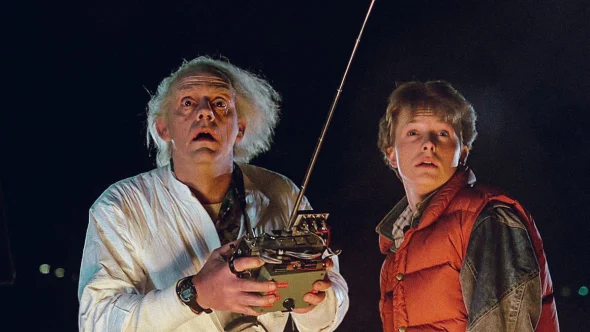
In 2007, Davis Guggenheim found himself at the Oscars with An Inconvenient Truth, his incendiary documentary about the dangers of global warming which won the Oscar for Best Documentary Feature. Now 16 years later, the filmmaker has a surprising response when asked about his defining memories of the night. "Oh my God… It wasn't winning," he says with a laugh. "Which was amazing!"
"I do remember Jerry Seinfeld walking onstage to present the Best Feature Documentary award and thinking, 'Oh, sh*t, here it comes...'" Guggenheim adds. "In that moment, it feels almost like you're in a reality show and you're about to get kicked off the island. In fact, that's exactly what it feels like."
Despite the surreality of his win, the moment that he remembers most vividly was when he learned that Melissa Etheridge had also won an Oscar for "I Need to Wake Up," the original song she'd written for An Inconvenient Truth. "It was like, 'What?! A documentary just won two Academy Awards?' It was really nice to see her win," he says. In true documentarian fashion, he notes that it felt more natural to focus on Etheridge's victory than his own. "It's almost easier to feel the joy for somebody else!"
In the years since An Inconvenient Truth, Guggenheim has helmed some of the most impactful and acclaimed documentaries of the 21st century, including It Might Get Loud, Waiting for Superman, and He Named Me Malala. His latest, Still: A Michael J. Fox Movie, sees the eponymous actor and advocate looking back on his life's story.
Below, Guggenheim shares with A.frame five of the films that most inspire him.

Directed by: Robert Zemeckis | Written by: Robert Zemeckis and Bob Gale
I believe Back to the Future is a perfect movie. About six years ago, before I made Still or the thought of it had even crossed my mind, I was installing a new projector in my office and I wanted to see how well it worked. Back to the Future was one of the films that I could play on it, and I was like, 'Okay, I'll turn this on just to test the projector's color.' My daughter was with me, and we turned it on and it was so good that we couldn’t stop watching it.
What's great about it is that it works on multiple levels: As a piece of raw entertainment and comedy, it's great, but it also has these deep themes about what time means and what love means. It's a perfect movie, and the craft in it is impeccable. I can't nitpick Back to the Future. There's not a line that's out of place. There's not a shot that's out of place. Robert Zemeckis is just an incredible writer-director.

Directed by: Charles Guggenheim | Written by: Charles Guggenheim and L.T. Iglehart
This is probably an obscure one for your readers, but my father made it and he won an Academy Award for it in 1968. He was working on Bobby Kennedy's presidential campaign when Kennedy was assassinated. In between the assassination in June and the Democratic National Convention in August, the Kennedy family and the Democratic Party asked my father to make a film that celebrated Bobby Kennedy's life. It was going to play at the DNC in front of everyone and, when it did, it stopped the whole convention. Everyone stopped and started watching and singing along with it.
It's a beautiful, beautiful movie. It's more of a poem than a documentary, and I have the Oscar that my father won for it in my house. It's a special film for me.

Directed by: Errol Morris
I have to mention Errol Morris' documentary, The Fog of War. His movies in succession, one by one, really dismantled what was once the accepted form for non-fiction. He paved the way for all of us and redefined all the assumptions people might have had about what a documentary could do. Obviously, he did that with his recreations in The Thin Blue Line, but also with his use of penetrating interviews and his use of archival footage in a much more abstract way in The Fog of War. It's been a really influential movie for me.

Directed by: James Marsh | Written by: Philippe Petit
I've screened Man on Wire in my office many times. I've screened it for friends. I've screened it for some of our fellows, and I think it's a perfect movie. It was the first time that I saw recreations in a documentary that were fully successful. In the same way that Errol Morris rewrote the form, Man on Wire set the standard for how you can tell a story in a documentary and even make it a caper movie. The movie has the tone of a caper thriller, but it's a documentary.

Written and Directed by: Brett Morgen
Moonage Daydream is groundbreaking, but in a bit of a different way. Brett finds a way to immerse you completely into the mind and spirit of the subject. It's like an anti-portrait portrait. He has a contempt for traditional narrative storytelling to the point where he totally strips that away. You see that in Jane and Montage of Heck, and then he goes all in on Moonage Daydream. You could leave the film and not actually know much about David Bowie that you could necessarily put on a Wikipedia page, but it captures who he is. You know him completely as an artist after that movie. Is there a better movie about being an artist? I can't think of one. The craft of it is just stunning.







